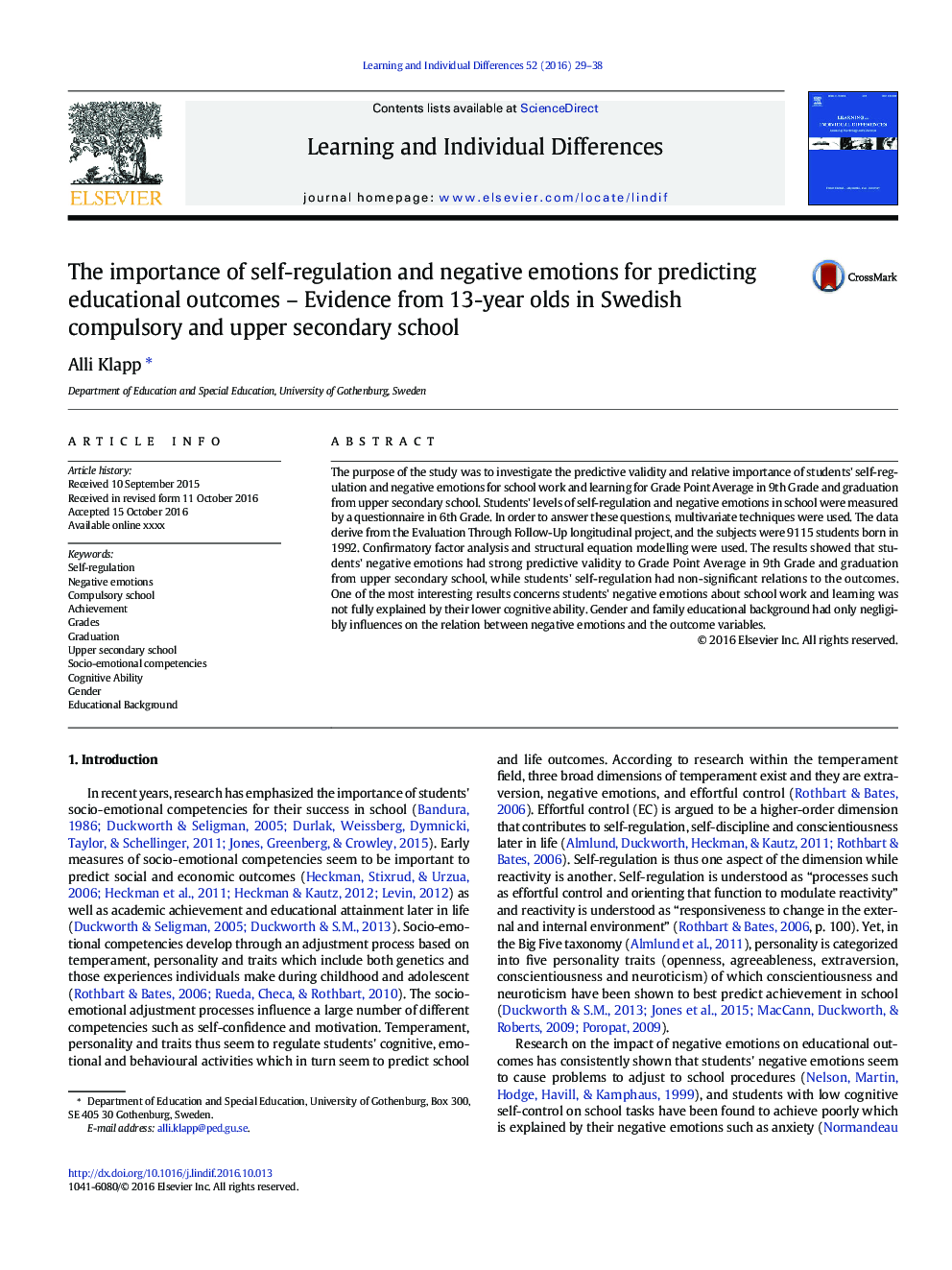| کد مقاله | کد نشریه | سال انتشار | مقاله انگلیسی | نسخه تمام متن |
|---|---|---|---|---|
| 4940065 | 1436371 | 2016 | 10 صفحه PDF | دانلود رایگان |
عنوان انگلیسی مقاله ISI
The importance of self-regulation and negative emotions for predicting educational outcomes - Evidence from 13-year olds in Swedish compulsory and upper secondary school
ترجمه فارسی عنوان
اهمیت خودمراقبتی و احساسات منفی برای پیش بینی نتایج آموزشی - شواهد 13 ساله در دانشکده اجباری و دبیرستان سوئدی
دانلود مقاله + سفارش ترجمه
دانلود مقاله ISI انگلیسی
رایگان برای ایرانیان
کلمات کلیدی
خود تنظیم احساسات منفی، مدرسه اجباری، دستاورد درجات، فارغ التحصیلی، دبیرستان، شایستگی های اجتماعی و احساسی، توانایی شناختی، جنسیت، سابقه تحصیلی،
ترجمه چکیده
هدف از مطالعه، بررسی اعتبار پیش بینی شده و اهمیت نسبی خودارضائی دانشجویان و احساسات منفی برای کار مدرسه و یادگیری برای میانگین نمرات درجه 9 و درجه فارغ التحصیلی از دبیرستان بود. سطح دانش آموزان خود تنظیمی و احساسات منفی در مدرسه با استفاده از پرسشنامه در رتبه هفتم قرار گرفت. به منظور پاسخ به این سوالات، از تکنیک های چند متغیره استفاده شد. داده ها حاصل از ارزیابی از طریق پروژه طولی پیگیری است و افراد 9115 دانش آموز در سال 1992 به دنیا آمدند. تجزیه و تحلیل عامل و مدل سازی معادلات ساختاری مورد استفاده قرار گرفت. نتایج نشان داد که احساسات منفی دانشجویان، اعتبار پیش بینی شدیدی را نسبت به نمره متوسط نمره 9 و درجه فارغ التحصیلی از دبیرستان داشتند، در حالی که خود تنظیم دانشجویان نسبت به پیامدهای نامطمئن داشت. یکی از نتایج جالب توجه، احساسات منفی دانشجویان در مورد کار مدرسه و یادگیری به طور کامل توسط توانایی شناختی پایین آنها توضیح داده نمی شود. پس زمینه ی جنس و تحصیلات خانوادگی تنها بر روی ارتباط بین احساسات منفی و متغیرهای نتیجه تأثیر منفی نداشته است.
موضوعات مرتبط
علوم انسانی و اجتماعی
روانشناسی
روانشناسی رشد و آموزشی
چکیده انگلیسی
The purpose of the study was to investigate the predictive validity and relative importance of students' self-regulation and negative emotions for school work and learning for Grade Point Average in 9th Grade and graduation from upper secondary school. Students' levels of self-regulation and negative emotions in school were measured by a questionnaire in 6th Grade. In order to answer these questions, multivariate techniques were used. The data derive from the Evaluation Through Follow-Up longitudinal project, and the subjects were 9115 students born in 1992. Confirmatory factor analysis and structural equation modelling were used. The results showed that students' negative emotions had strong predictive validity to Grade Point Average in 9th Grade and graduation from upper secondary school, while students' self-regulation had non-significant relations to the outcomes. One of the most interesting results concerns students' negative emotions about school work and learning was not fully explained by their lower cognitive ability. Gender and family educational background had only negligibly influences on the relation between negative emotions and the outcome variables.
ناشر
Database: Elsevier - ScienceDirect (ساینس دایرکت)
Journal: Learning and Individual Differences - Volume 52, December 2016, Pages 29-38
Journal: Learning and Individual Differences - Volume 52, December 2016, Pages 29-38
نویسندگان
Alli Klapp,
